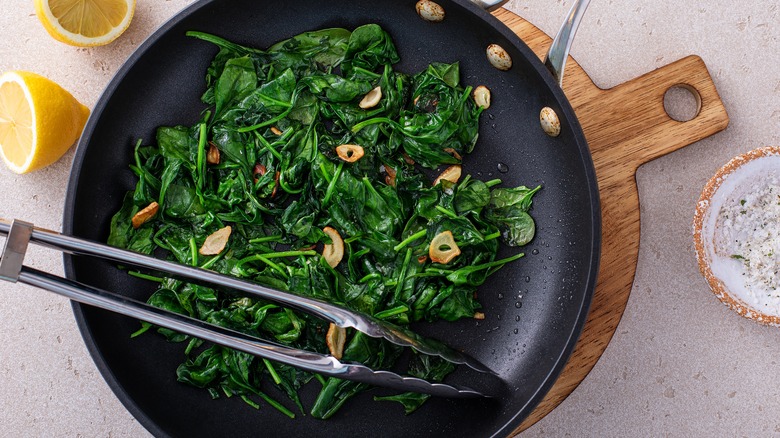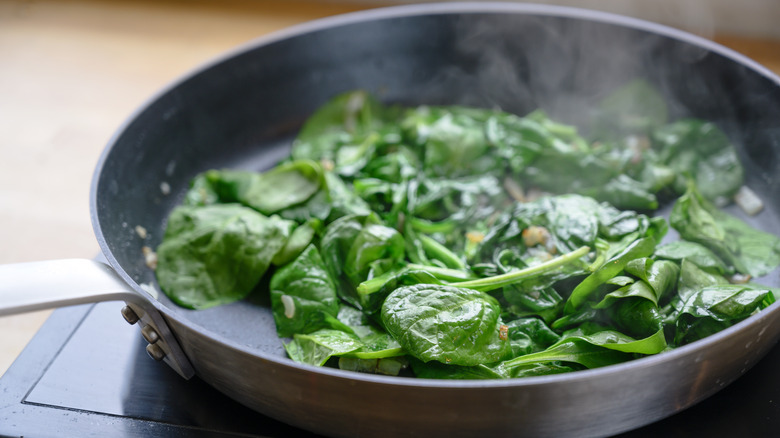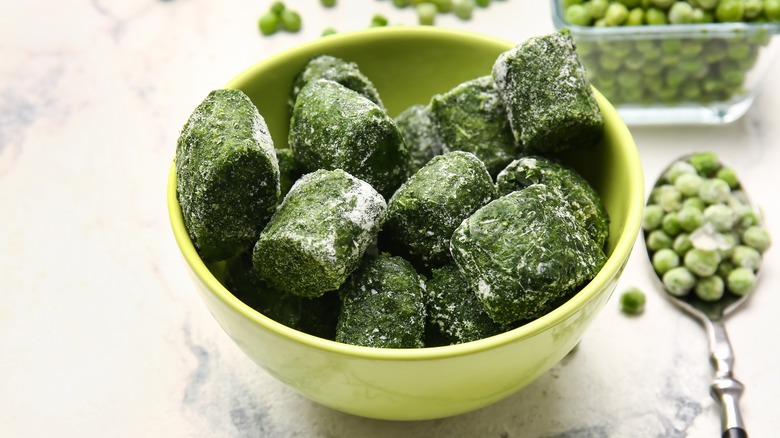Why Does Spinach Shrink So Much When It's Cooked?
Fresh spinach may be delicious, but it's one of the more troublesome leafy greens to store and cook. It tends to go bad fast, so you might decide to cook a big container of it, only to watch the leaves shrink to a shocking degree. You can fill a whole pan with spinach, but end up with just a handful on your plate.
This phenomenon is certainly annoying, but there's no avoiding it. The reason spinach shrinks so much is because of its high water content. This water quickly escapes when the vegetable is cooked, whisking away the main component of the leaves, which decreases their volume. In fact, spinach can shrink by over 90 percent of its original volume, so 10 cups of the raw leaves could turn into just one cup after cooking.
While spinach shrinkage can be disappointing, the flavor and texture of the greens doesn't have to be. There are ways to prevent them from turning soggy or slimy as they cook. Soft spinach can be fine in a casserole or soup, but when serving it on its own, the best way to cook it is a quickly sauté over high heat, stirring constantly. This helps the liquid released by the leaves to evaporate straight away, so the greens don't have a chance to soak and turn wet. The leaves will still shrink, but following the right steps can keep their flavor and color intact.
Tips for cooking spinach that's not soggy
If you know you're going to wind up with less spinach than you started with, at least make sure the greens turn out as tasty as possible. Cook spinach in a large pan so it has more contact with a hot, spacious surface area. This encourages quick cooking and evaporation of excess water. Cook the greens at a high temperature to avoid soggy, overly-shrunken leaves, and never cover the spinach with a lid while cooking. This veggie contains oxalic acid, and when this acid interacts with the condensation that forms underneath the pan's lid, it makes the spinach soggy and its color drab.
It's also important not to add salt too early. Salt breaks down the cell walls within spinach, causing the problematic oxalic acid to spread throughout the leaves. Instead, season the spinach with salt right before serving it, perhaps with a squeeze of lemon to boost the flavor. As a bonus, the ascorbic acid in the citrus also helps to dissolve oxalic acid, further preserving the greens' color and texture.
Once the spinach is cooked, which only takes a few minutes, it helps to get rid of any leftover water. You should be squeezing the life out of cooked spinach to prevent it from becoming mushy. With one taste of the finished dish, any lingering annoyance about shrinkage should be replaced with the satisfaction of a job well done.
Choose frozen spinach to avoid disappointing shrinkage
If shrinkage during cooking really bothers you, and you'd prefer to know exactly how much spinach you'll end up with, consider choosing frozen spinach rather than fresh. Because it's already cooked before freezing, this form of spinach won't shrink any further once it's heated up. Cooking the right amount will no longer be a guessing game, but fresh and frozen spinach can't always be used interchangeably.
Frozen spinach is by no means inferior, as it can be just as tasty and often more nutritious than the fresh stuff. However, it's best suited to dishes such as soups, curries, dips, or sauces, due to it softer texture once thawed. You can use the spinach straight from the freezer for extra convenience, but make sure it's heated thoroughly before serving.
If you're preparing spinach as a side dish on its own, or as a starring ingredient in a main dish, fresh spinach will offer a better texture than frozen. Fresh baby spinach also works in dishes where the leaves can be cooked quickly, such as when folded into an omelet. And if you need a bright side to the shrinkage, keep in mind that eating more of these nutritious greens is always a good thing, and some shrinking in volume gives you room in your stomach for more spinach. At least you'll be getting more iron, vitamin C, and calcium in every meal.



